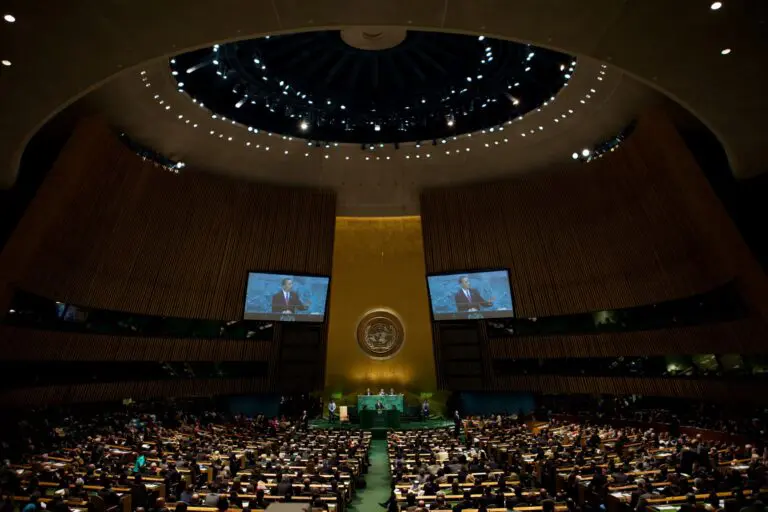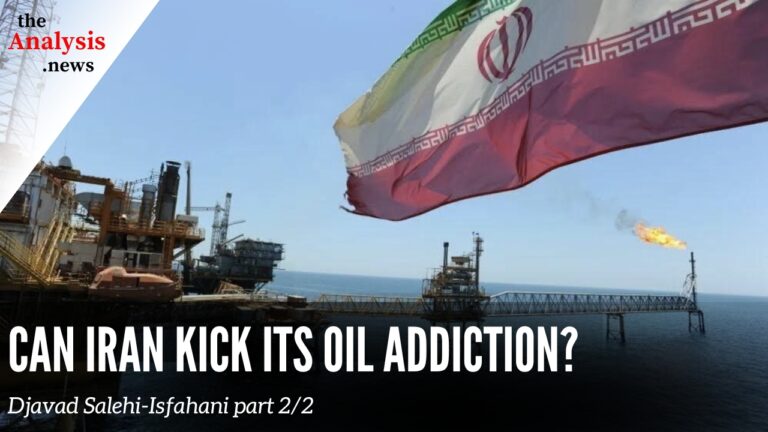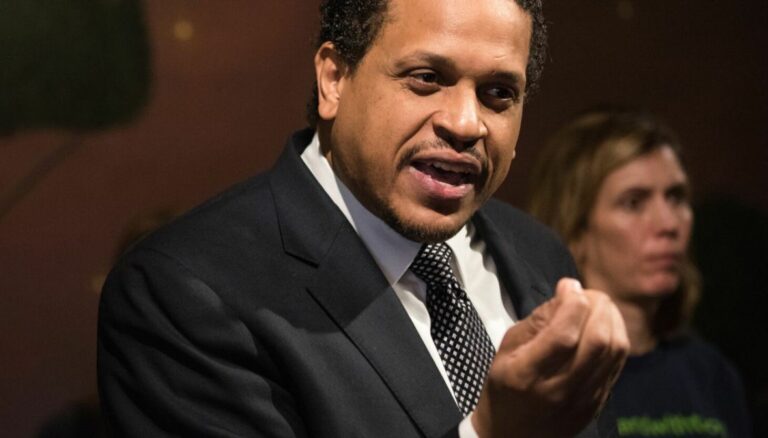This is an episode of Reality Asserts Itself, produced on May 26, 2017. On Reality Asserts Itself, Prof. Alnasseri tells the story of his militant working-class family, the class struggle in Iraq and the sectarian conflict created by the U.S. invasion.
PAUL JAY: Welcome to the Real News Network. I’m Paul Jay and this is Reality Asserts Itself. We’re continuing our discussion, it was about Alnasseri and he now joins me in the studio. Thanks for joining.
SABAH ALNASSERI: Good to be with you, Paul.
PAUL JAY: One more time, Sabah was born in Basra, Iraq. He teaches at the Political Science Department at York University in Toronto. His most recent publication is Arab Revolutions and Beyond – The Middle East and Reverberations in the Americas. In part one, we talked about Trump’s visit to Saudi Arabia. And near the end, we got into what might be the bigger strategy here which is the breaking up potentially of Iraq, the target being, there’s a lot of easy-to-get, in a sense cheap to get oil in Iraq that’s not even being exploited. Then a lot of the oil that is being exploited is not directly under American Oil companies which is certainly not the plan when Bush-Cheney went to Iraq in the first place. There’s a lot of reasons why Iraq sticks in the craw, the throat of American Military establishment. They don’t like the idea that it looks like they lost in Iraq. They don’t like that Obama took troops out. The job wasn’t done. They thought if they’ve been more troops, they could’ve finished the job. And if you define the job the way Trump defines the job, it means controlling the oil. They don’t like the fact the Iraqi government is perhaps more pro-Iranian than is pro-American. But let’s back up, this is Reality Asserts Itself. One of the things we try to do with guests is talk about who they are. But your story and the story of your family intertwines with the story of Iraq. Give us a bit of your history, the history of your family, and in that we’ll learn more about how Iraq got where it is.
SABAH ALNASSERI: Right. I come originally from a nomadic family. Literally, my grandfather and my father used to live in the desert. At the later stage, my father moved to the urban center of Basra in the south of Iraq where he settled there. At the beginning of British occupation of Iraq-
PAUL JAY: What year are we in?
SABAH ALNASSERI: After the first World War when the Middle East was divided among the French and the British Empire at that time. So Iraq was part of the British Empire.
PAUL JAY: It’s in what, like 19-
SABAH ALNASSERI: 1918 to 1920s. You have the first massive revolt against the British Empire in Iraq in 1920. One of the figure of this Revolution was my grandfather. People in Iraq, especially in the south, they wrote a lot of poems about him. Because what the British empire did, one of things they did at that time, they used to bring the tanks and put them in front of the houses of the people and they give them few minutes to leave the house. If they don’t leave, they bomb the house on their head, much more like the scenario in Israel and Palestine. For that reason, sometimes they wanted to have a, let’s say, highway from the Rumaila Oil Field to the port and you have to a lot of communities living there. So they want to cleanse the whole area from the civil population. One of these moments, my grandfather stood in front of these tanks, British tanks, and challenged them. If they want to bomb his house, they should bomb him first. That was a very critical moment where the British soldiers and officer didn’t know exactly what to do because if they knew if they would have bombed him, probably they would have escalate the whole situation, so they roll back. That’s where people start writing poems. And what does this tell us is that the revolt of 1920 against the British occupation was not so much a nationalist, well organized and led movement. It was mostly spontaneous moment where you have people humiliated, dehumanized by the British Empire that’s sparked the whole revolt and revolution against the British Empire at that time. My grandfather, he can say he was a proto-Arab nationalist in a sense. Because there was no such a thing Arab Nationalism in Iraq at that time. Later on, my father was much more radical than my grandfather. He became a communist and my brother would became a communist. So the household in the 1950s, 60s was much more dominated by the communist ideology.
PAUL JAY: But the Iraqi Communist party finally became one of very almost the largest party in Iraq for a while.
SABAH ALNASSERI: Very popular. And in the Middle East, the most powerful communist party in the Middle East. The way they managed to expand those social basis precisely by recruiting all the enslaved, indebted, exploited peasant of the Iraqi societies, the biggest chunk of the Iraqi society or we can say, the popular classes were peasant. Most of this peasant were either Shiite or Kurds. So here you go, you have a exploited popular class, the peasant, indebted for their whole life to their landlords. They cannot even leave the land because of the debt they have. The burden of the debt on them imposed on them by these landlords. These landlords in the South and the North were Kurds and Shiite landlords, so you have a Shiite, Kurdish ruling class in Iraq and exploited peasant class, Kurds and the Shiite. Whereas this so called Sunni or other minorities, the Christian, the Jewish, because of the institutional experience, especially under the Ottoman Empire, they were the bureaucrat and so on. They were sustained by the British Empire. They were running the State Institution. They were not the ruling class. You can say they were the middle class, the professional class that controlled the state apparatus, institutions.
PAUL JAY: So when did that change?
SABAH ALNASSERI: That stayed actually until 2003, until the occupation of Iraq. So even when you have the, in 1958, the Revolution in Iraq against the monarchy and the influence of the British Empire, the indirect influence of British Empire in Iraq, there was a coalition between Nationalists, Pan-Arabists, Communists, and the Army. There was an officer, let’s say, Abdul Karim Qassim who led at that time the whole movement. So there was a broad coalition of different-
PAUL JAY: Where is your father entering this time?
SABAH ALNASSERI: Well, he was on the Communist Party of the equation-
PAUL JAY: From ’58?
SABAH ALNASSERI: ’58. They supported Qassim when he came to power. Although, he was a Sunni according to this new narrative. But if you look at, for instance, the biggest working class neighborhood in Baghdad is the so-called “Al-Sadr City”. The Al-Sadr City used to be called the Revolution City. It was built by Abdul Karim Qassim, social housing for the poor Shiite peasant who migrated to the urban center to work as wage laborer at the [inaudible]. So, you have a Sunni, so-called Sunni officer building social housing, decent social housing for the Shiite communities. What does this tell us is that until probably the occupation of Iraq, there was some tendency [inaudible] but a marginal one, until the occupation of Iraq, this so-called “Sunni-Shia” divide, and Christian and Muslim was not present in the everyday life and in the politics of Iraq. It is a recent introduced phenomena that has served the occupation of Iraq and it served the allies of the United States in Iraq, the Shiite parties who don’t have social bases.
PAUL JAY: We’ll talk about the rise of Saddam and the role of the CIA.
SABAH ALNASSERI: I mean, in 1963, a few days before Qassim was assassinated, by the Ba’athists by the way, supported by the CIA, he gave a speech on TV and his intention was to nationalize the Iraqi oil. Because as you know, Paul, and until the 60s, those oil producing countries like Saudi Arabia, Iraq, Algeria, etc, they didn’t have access to the oil. It was controlled either by British or American corporation. So this government used to receive peanuts on revenues. They could not pursue projects, social projects, housing, health care, education, nothing. So the only way to have access to the oil and to the revenue of the oil is actually to nationalize the oil, that’s what Mosaddegh tried in 1953 and he was-
PAUL JAY: In Iran?
SABAH ALNASSERI: In Iran by a … CIA support a coup against him. That’s what Qassim tried to do in 1963 and it failed, too. There was also a CIA-supported coup against them and he was assassinated. Not only he … There were two moments here. One of them is the oil nationalism I would like to call it, that Qassim represent. The other one was the Communist Party. Although, the Communist Party was not party of government in Iraq but they were part of this independence project, they supported Qassim. The United States wanted to get rid of Qassim and at the same time, the Communist Party. So they supported the Ba’athist at that time to attack both. You have in 1963 one of the biggest massacre against Communism in the history of Iraq. I think up to 5,000 communists were massacred in Mosul and Baghdad and most of different cities of Iraq.
PAUL JAY: What happened to your father?
SABAH ALNASSERI: None of them were massacred. What happened is that, in the state of the Ba’athist, because here’s the thing, until 1963 the Iraqi Army was predominantly nationalist and there was a huge communist present with the Army. So you have the army actually warned us a few days before he’s assassinated. There is an attempt a coup or something like that against the government, “We need to act now.” Now the Communist Party, they had also the same information. They could have supported Qassim or the army against or to preemptively go against the Ba’athist. The Soviet Union was against it. Here’s the irony, the Soviet Union actually ordered the Community Party at that time not to support Qassim, et cetera, or not to go against the Ba’athist because they didn’t want to escalate the conflict with the United States after the Cuba crisis and after the building of the wall in Europe. So they’re trying to make some concession here by supporting the Nationalist or Pan-Arabist against the communist. So Qassim became, in a way, a victim of both the anti-communist and the anti-oil nationalist project of the United States at that time.
PAUL JAY: During the days of this massacre, where’s your father?
SABAH ALNASSERI: In the South, in Basra. Basra was less hit by these massacres compared to Baghdad and Mosul right. The more intense battles were in Baghdad because it’s the capital of Iraq where Qassim was assassinated and Mosul. Why? Because Mosul historically, and still actually is until the occupation of Iraq, was the center of the Iraqi army. Most of the Iraqi generals, officers, etc, they come from Mosul. They control Iraqi Army ever since the creation of the Independent Iraq in 1932. They were nationalist or Pan-Arabist, not necessarily Ba’athist, and that’s one of the things, the United States mistakenly confusing the whole security apparatus and the Army in Iraq for being Ba’athist. They realized after a while when they had access to some of the archives of Saddam Hussein up to 87% of the leadership of the Iraqi Army, not only the soldiers, but the leadership of Iraqi Army were not Ba’athist.
PAUL JAY: So, your father is in Basra and he’s okay.
SABAH ALNASSERI: He’s a worker. He was not an officer or general.
PAUL JAY: What kind of work did he do?
SABAH ALNASSERI: He used to work also in the oilfield which is in Rumaila, once he settled in Basra in 1950s. He starts working in the oilfields. There was at that time, a massive immigration of the peasant from the rural areas into the city of Basra, Baghdad, and so on. But because most of the peasant were fleeing these debt and landlord oppression, the Communist Party was very successful recruiting all these peasant and that’s why the number of the Communist Party expand exponentially in 1950s because a massive communist, massive so much that for the first time in history the Shiite institution, [inaudible] and Karbala, and one of the most prominent figure at that time, Muhammad Baqir al-Sadr, the grandfather of Muqtada al-Sadr, he created the Dawa Party in 1957. For the first time, the Shiite broke with their tradition of being nonpolitical, non-involved but in the state. Here’s one of the thing I want to talk about namely the exclusion of the Shiite from the State Institution was not due to sectarian notion and so on, but precisely the Shiite and their religious institution insisted on being apolitical, not to be part of any state until the Messiah’s, he will come back, et cetera. So they were excluded not because they were Shiite, it was a self-exclusion, politically speaking. He broke with that in 1957. He said, “If we don’t create a Shiite Political Party, all our social basis, all the peasant and so on, they will go to the Communist parties. And we end up having not only less social basis, but also less revenues. Because most of the Shiites, peasant or landlords used to pay the tax to this institution.
PAUL JAY: And the Communist Party was a Shia-Sunni mix-
SABAH ALNASSERI: It was a mix of every segment of the Iraqi society. You have Christian Kurds, Shiites, Jews, every sort of Iraqis were in the Communist Party. That was the success of this party that made it so dangerous to the United States and probably also to the Soviet Union.
PAUL JAY: So that party comes into power and they’re supported by the Americans in order to attack the communists.
SABAH ALNASSERI: But they were not successful in 1963. Although, they assassinated Qassim. De facto, the Iraq Army represented by the brother Arif took over. So from 1963 to 1968, you have the Pan-Arabist, the Arab brother, much closer to Nasser than the Ba’athist. But then 1968, again, the Ba’athist pushed against the brother Arif and came to power in 1968 only, not before that. So in this period, from 1963 and 68, was a relative stable and a quasi-liberal phase of Iraq where parties and some sort of civil societies living is much more liberal, not so much Nationalist as the Ba’athist took it up to 1968. They were much more closer to Nasser than the Ba’athist.
PAUL JAY: For those who don’t know Nasser is a leader of of Egyptian nationalism, and very much opposed by the Americans and Saudis.
SABAH ALNASSERI: One of the ironies of today’s conflict, let’s say in Yemen, is the 1960s you have Egypt and Saudi Arabia on the opposite side of the war in Yemen. Gamal Abdel Nasser and the other Pan-Arabists in Syria and in Iraq supporting the Pan-Arabist and the Socials in Yemen against the conservative forces in Yemen supported by Saudi Arabia. The irony is not only you have Egypt and Saudi Arabia that time on the opposite side, now they are together against in Yemen. But the second irony is that the same forces they are fighting today, Al Houthi and in Yemen, they were the Allies of the Saudis at that time against it and Asad and against the socialism Pan-Arabist.
PAUL JAY: So talk about Saddam. How and when does Saddam come to power?
SABAH ALNASSERI: Saddam, he came to power at the end of the ’70s, in ’79. They were multiple reasons for that. But let me go back a little bit, when the Ba’athist took over in 1968, they did not have social basis or social basis like the Communist or the Pan-Arabs and so on. Even within the army because most of the army was either Pan-Arabist, Nationalist, or affiliated party with the Communist Party. So they didn’t have much of support within the state apparatus and within the societies. What happened is, I think that was a clever move by the Ba’athist at that time, and it was a progressive move in the sense. They realized the only way to gain legitimacy is to nationalize the oil. But the only way to nationalize the oil is to have the support of their political enemies, the Communists, because they have enormous influence on the working class in Iraq and especially the trade unions and so on. So if you want to nationalize the oil you want to have the Communists on board, you want to have the workers, the trade unions, everybody on board. That’s where in 1972 they went into a so-called a “national front” strategy where they nationalize the oil and start introducing a lot of social economic projects in Iraq like free health care, free education, infrastructure, right, not only the state will guarantee jobs for you, but this is your right constitutionally.
PAUL JAY: So this has to be politically, ideologically, a big threat to the Saudis?
SABAH ALNASSERI: Right. And that’s why you can see in 1972 the constitution of Iraq was probably the most progressive constitution at that time socially, and in the sense of gender equalities and in the class sense, etc. This actually lived until 1978. It went very well. Until at that time, Ahmed Hassan al-Bakr, the president of Iraq, he was a Ba’athist but he was much more on the liberal side of the Ba’ath party. When he was sick and went to France to be treated, that’s where Saddam Hussein and the right wing part of the Ba’athist party pushed against the left wing of it. The left wing socialist Ba’athists were very close to the communists. They were ally of the communists. The reason why Saddam Hussein pushed that time in 1979 for–you can see three different serious developments at that time. The first one, you have the peace treaty between Egypt and Israel, which de facto excluded Egypt from the rest of the Arab world. It used to be the center of the Pan-Arabism and so on. It was de facto excluded. The second movement was the Revolution in Iran. It became an Islamic revolution, it’s a conservative shift in a way. And the third, also in 1979 which is interesting, was birth of Al-Qaeda and Bin Laden and Mujahideen against the Soviet Union.
PAUL JAY: In Afghanistan.
SABAH ALNASSERI: So you have multiple conservative shifts that enable the Saudis the dominant political force in the region, in the wider region of the Middle East, rather than Egypt or Iraq. At that moment, at that conjecture-
PAUL JAY: In alliance with the Americans?
SABAH ALNASSERI: In alliance with the Americans. At that conjecture, Saddam Hussein pushed, and I assumed maybe with the support of the United State or the Saudis, against the left-leaning socialist Ba’athists and Communists. So, once he pushed against Al-Bakr, his uncle actually, and took over. He start his campaign massacring and incarcerating and suing the Communists, Socialists, even Ba’athists. A lot of them fled the country, went to Syria or to Russia, etc. It’s such a bloody of the Iraq history which led again to the Iraq-Iran War in 1980.
PAUL JAY: Okay. In the next segment of our Series of Interviews with Sabah, we’re going to continue the story of the Rise of Saddam Hussein and how the Hussein dictatorship, which is what it became, affected Sabah’s father and himself as he becomes more political and more active. Through them, through the lens of that family, we’ll learn more about the history of Iraq. So, please join us for the next segment of Reality Asserts Itself.
Never miss another story
Subscribe to theAnalysis.news – Newsletter
“Sabah Alnasseri is a Professor of Middle East Politics at York University, Toronto, Canada. Born in Basra, Iraq, he earned his Ph.D. at the Johann-Wolfgang Goethe University in Frankfurt, Germany. His publications cover topics in political economy; Marxist state theory in the tradition of Gramsci, Poulantzas and Althusser; regulation theory; and Middle East politics and economy.”












